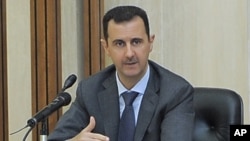The four European members of the U.N. Security Council say they will push for a resolution imposing sanctions on the regime of Syrian President Bashar al-Assad. The proposed move at the United Nations follows actions earlier Thursday by the United States and Europe calling for President Assad to step down and the imposition of new unilateral measures against his government.
Britain’s deputy U.N. Ambassador Philip Parham said there has been a lack of credible progress by Damascus to stop its bloody crackdown on pro-democracy protesters and implement promised reforms, and the time has come to increase international pressure to bring that about.
“Also here in the council, we believe the time has come for the council to take further actions to step up the pressure against those who are responsible for the violence against the citizens of Syria," said Parham. "So we will be working on a Security Council resolution that will include measures to apply that pressure to those who are responsible, and we will be discussing that resolution with our colleagues on the council over the coming days.”
Ambassador Parham would not go into detail about the sanctions, saying he did not want to preempt discussions among the 15 members. But he pointed to European Union imposed sanctions, which include asset freezes, travel bans and an arms embargo, saying those are the type of measures that will make it more difficult for the regime to continue the violence.
The United States, which on Thursday called for President Assad to step aside and announced new targeted sanctions including against Syria’s petroleum sector, threw its support behind the Europeans. U.S. Deputy U.N. Ambassador Rosemary DiCarlo:
“I would like to stress that we support further action in the Security Council through a resolution," said Di Carlo. "More than ever the Security Council should increase pressure on Assad’s regime.”
But it could be a lengthy and difficult process to persuade council members Russia and China not to veto such a measure.
U.N. High Commissioner for Human Rights Navi Pillay flew in from Geneva to address the closed meeting. She told reporters afterwards that she recommended the Security Council refer the situation in Syria to the International Criminal Court, noting the council is the only body that has the power to do so.
“I also recommended referral to the International Criminal Court because all the evidence produced by the Commission’s report support a finding of widespread and systematic violations of human rights equaling crimes against humanity," said Pillay.
But she said she does not “hold out much hope” that the Security Council will act on her recommendation.
The report she refers to is from a U.N. fact-finding mission and was released Thursday. It cites widespread and systematic human rights violations against civilians in Syria. It includes evidence of over 350 summary executions; the use of torture; the use of tanks, heavy weaponry and helicopters to subdue restive populations; and the presence of mass graves, all of which it concludes may amount to crimes against humanity.
The mission was not allowed into Syria but interviewed 180 people in four countries, including Syria, about grave human rights violations over the past five months.
U.N. Humanitarian Chief Valerie Amos also briefed the Council. She said afterwards that Damascus has agreed to allow in a humanitarian mission this Saturday for about three or four days. She said the U.N. has guarantees that there will be full access and the mission would focus on areas where there have been reports of violence so the team could see for itself what has been going on.
President Assad’s government has denied accusations that it is killing peaceful protesters, saying it is fighting armed gangs and foreign fighters who want to overthrow the government.
At the United Nations, Syrian Ambassador Bashar Ja’afari said operations by the Syrian security forces have already stopped.
“It is true," said Ja’afari. "It is already a fact on the ground. The military and police operations stopped in Syria.”
He added that President Assad has issued 20 reforms since March, but that “some people” are not willing to understand or acknowledge them.
Human rights groups and activists say at least 1,800 civilians have been killed since pro-democracy protests began in Syria in mid-March.
Europeans to Push for Syrian Sanctions in UN Security Council











